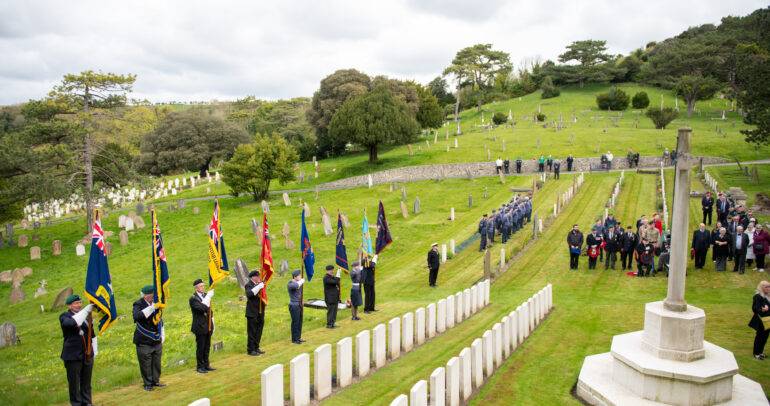106-osioms Doverio patrulių reido Zeebrugge metinėms, balandį Doveryje vyko minėjimai 23, 2024. Gerbiamoji Catherine Tucker vedė pamaldas Šv. Jokūbo kapinėse 11 val, kur ilsisi viceadmirolas seras Rogeris Keyesas ir žuvę antskrydžio herojai. Vainikus padėjo Piliečių atstovai, along with Veterans’ Associations, Community Groups, and families of the fallen.
The raid on the Zeebrugge mole, occurring on St. George’s Day in 1918, stands as a poignant chapter in both British and Belgian history, symbolizing resilience and sacrifice during the First World War. At noon, The Right Worshipful, The Town Mayor of Dover Cllr Susan Jones, rang the Zeebrugge Bell—a symbol from the King of Belgium for Dover’s sacrifice. Following the bell ringing, a remembrance service was held at the People of Dover War Memorial, honoring all those who served and sacrificed.
The next commemoration will be held on 23rd April 2025.
Historical Background
The Zeebrugge Raid was a daring and heroic mission undertaken by the Royal Navy during the First World War. On 23rd April 1918, a squadron of British warships sailed towards the German-occupied port of Zeebrugge in Belgium, with the aim of blocking the canal entrance and preventing German U-boats from accessing the English Channel.
The operation involved several elements, including a diversionary attack on the nearby port of Ostend, a smoke screen to conceal the ships, and the deployment of troops to storm the mole (a long pier or jetty) at Zeebrugge. The plan was risky and audacious, with the troops facing heavy resistance from the defending German forces. Despite the losses suffered by the British, the mission was ultimately successful, with three old ships sunk in the canal entrance, blocking access for U-boats.
The Zeebrugge Raid was a significant event in the First World War, as it disrupted Germany’s naval operations and contributed to the eventual Allied victory. The bravery and sacrifice of the British and Belgian troops involved in the mission were widely recognized, and the raid became a symbol of the courage and determination of the Allied forces.
The annual commemoration of the Zeebrugge Raid in Dover is a way to honor the memory of those who lost their lives in the mission and to celebrate the bravery and sacrifice of the troops involved. The ceremony includes service at St James’ Cemetery, where many of the fallen soldiers are buried, as well as the ringing of the Zeebrugge Bell at Dover Town Hall. The bell, a gift from the King of Belgium, is a symbol for the sacrifice of the fallen soldiers, many of whom were from Dover. The event is open to the public, and residents of Dover and others are encouraged to attend to pay their respects to the fallen soldiers and to remember their bravery and sacrifice.
Photography: Albane fotografija
